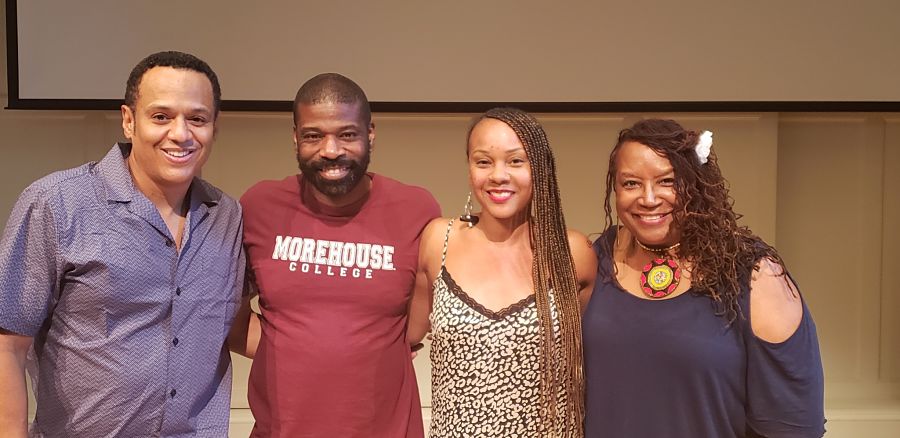The dearth of Black artists working onstage has been a fact of life since the inception of the regional theatre movement. It persists to this day: The Actor’s Equity 2020 Diversity & Inclusion Report found that only 10.37 percent of acting contracts nationwide went to African Americans. And a Dramatist’s Guild study, undertaken with the Lillys in 2018 under the name the Count, found that just 15 percent of plays produced in the U.S. are by writers of color, despite people of color making up 40 percent of the population.
Closer to home, in the last five years counted by American Theatre‘s own Top 10 Most-Produced Plays list, only five Black playwrights have made that most-produced plays list (and only seven have made it onto the last five years of our most-produced playwrights list).
Institutions have been moving at all deliberate speed to rectify this disparity, but after last summer’s Black Lives Matter demonstrations, the sense of urgency to create a more equitable theatre has intensified. In the last seven months, there has been a groundswell of support for Black-owned businesses and nonprofits that are focused on specifically and directly helping the Black community. People have recognized that to dismantle a flawed system, we need to invest in a new one. After decades of talk about funding theatres and artists of color, some are finally stepping up with the money.
Among the most significant of such recent efforts is the Black Seed initiative, which has announced a goal of raising $10 million to support 100 Black theatres in the next three years. The Black Seed is helmed by the Billie Holiday Theatre in collaboration with the CRAFT Institute, Plowshares Theatre Company, and WACO Theater Center.
“Black theatre is currently at an extremely critical juncture, and has been even before 2020 saw the converging of two pandemics: COVID-19 and the fight for racial justice and equity,” said Indira Etwaroo (she/her), the Black Seed National Advisory Committee Chair. “The median budget size of the 20 largest arts organizations of color surveyed by the DeVos Institute is 90 percent smaller than their mainstream counterparts, and more than half of these organizations were operating in 2013 with budget deficits. These were issues that needed to be addressed before the pandemic, and now the need to ensure their thrivability is even more evident.”
The initiative has raised $7 million thus far, with a lead gift of $5 million from the Andrew W. Mellon Foundation and including Bloomberg Philanthropies, Doris Duke Charitable Foundation, the Ford Foundation, Howard Gilman Foundation, and the New York Community Trust. As Etwaroo put it, spreading the wealth widely is a part of the point.
“The Black Seed is a synergistic solution to a long-standing problem of inequitable funding, and we stand firmly rooted in the concept that we are greater, as a sector, than the sum of our parts,” said Etwaroo. “We wanted to ensure that it would be a brand-agnostic endeavor and not individualistic to one theatre or the re-entrenchment of a scarcity model geared towards anointing a select few institutions, but rather an initiative led by and for the collective.”
For their part, Black theatres have been focused on dismantling injustice for decades. Most were founded within a social justice context, with the goal of telling stories written by Black writers, performed by Black actors, for Black audiences. But as diversity funding has often been funneled to larger white institutions, dollars for Black theatres to produce world premieres of Black work have been dwindling. And even with those diversity dollars, too many plays and musicals written by Black playwrights get stuck in the development phase, in a queue with other “diverse” work that’s too often not intended for white theatres’ mainstages anyway.
Jamil Jude (he/him), artistic director of True Colors Theatre in Atlanta, believes that if Black artists can produce new work at institutions where they don’t have to justify who and why they are as much as they do at predominantly white institutions, the work has a better chance of thriving. What’s more, he said, the cachet of producing successful world premieres is as critical for Black institutions to attract major gifts as it is to other theatres.
This is why True Colors Theatre has created the Drinking Gourd Initiative with the Hansberry Project to commission new plays by Black playwrights. The idea of the Drinking Gourd is to establish a model for rolling world premieres at Black theatre companies. The plan is to collaborate with a cohort of 5-10 Black theatres across the country, who will each nominate a writer and agree to stage a workshop production of a new play by that writer. Then, following those workshop stagings, one writer will be selected to have a rolling world premiere on the mainstage of all of the theatres in that cohort.
“We hope to reduce the amount of Black plays that get killed and panned after their premiere and the writers are never heard of again,” said Jude. “We hope to support writers in a nurturing environment that understands the context of their work so that writers don’t feel like guests in someone else’s house but feel at home throughout the birthing process of their work.”
The first rolling world premiere is slated for 2024, with readings and workshop productions of the playwrights nominated but not commissioned in 2022 and 2023.
Similarly, North Carolina Black Repertory Company announced a new-play commissions initiative, the Sylvia Sprinkle-Hamlin Rolling World Premiere Award, at the National Black Theatre Festival in 2019. Money from the Black Seed and South Arts is helping the theatre grow the initiative.
Their first play in the program is Phenomenal Woman: Maya Angelou, a biography of the late poet written by Nambi E. Kelley. The play was set to premiere last year, with productions at North Carolina Black Rep, Hattiloo Theatre in Memphis, and Ensemble Theatre Houston before possibly heading to Broadway. Though the production has been postponed to this summer, its potential commercial future is being developed and produced by David Michael Rich of Corstoria, LLC, and J. Todd Harris of Branded Pictures Entertainment, who caught the play in an earlier form at the festival.
“The hope is exactly what happened to Nambi’s play: a Broadway producer sees it and develops it for New York stages,” said NC Black Rep artistic director Jackie Alexander (he/him). “I hope a publisher sees that it’s had successful productions in five major cities and says, ‘Hey, we should publish this play.’ I also hope that other regional theatres decide to create their own rolling world premiere award. We want to bring Black theatre to the forefront and create future classics of the genre.”
NC Black Rep will begin accepting submissions for the next Sprinkle-Hamlin Rolling World Premiere Award in mid-March. West Coast Black Theatre Troupe and St. Louis Black Rep have come on board for the next round.

Meanwhile, actor, composer, and playwright Douglas Lyons (he/him) wants to provide a leg up for Black students before on their way into the professional world. As artist-in-residence at the Directors Company, he is launching the Next Wave Initiative program, which will offer four scholarships named for significant Black artists: the Lorraine Hansberry Writing Scholarship, Spike Lee Directing Scholarship, Hattie McDaniel Acting Scholarship, and Alvin Ailey Dance Scholarship. Applications are open through March 1.
On Feb. 27 at 8 p.m., a reading of Lyons’ play Chicken & Biscuits, a dysfunctional family comedy starring Janet Hubert (The Fresh Prince of Bel-Air), Michael Urie (Ugly Betty) and Carly Hughes (American Housewife), will serve as a fundraiser for the scholarship program. So far, he and his company have raised more than $30,000 in order to sustain the scholarship fund for years to come.
Lyons’s vision for Next Wave is an infusion of new talent into the field. “Ten years from now, when that new director is onstage at the Tonys, we want to be able to say that they were a Next Wave scholar and we knew. As a composer and playwright, I also understand that in this white supremacist system, awards have a lot of power in helping to get attention from people.”
The “for us, by us” attitude behind these initiatives and others is in the spirit of creating equality of opportunity in the field. Over the last few months, more Black people have been appointed to leadership positions at some of the nation’s top theaters, and many theatres have begun to announce more diverse seasons. The hope is that Black artists and institutions can also seize the moment while people are eager for change.
“Over the past year, one of the good things that has happened is that funding has opened up,” said Alexander. “Hopefully that will continue.”
Kelundra Smith (she/her) is an arts writer based in Atlanta, and a contributing editor at American Theatre. kelundra.com


